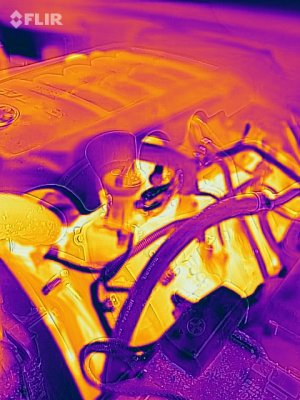Will check on this but I think OKFan belt tight enough?
You are using an out of date browser. It may not display this or other websites correctly.
You should upgrade or use an alternative browser.
You should upgrade or use an alternative browser.
Mild Overheating, not at idle but at speed !
- Thread starter neon
- Start date
Right - IMO - if you are having problems when moving (at any decent speed) - that pretty much rules out fan clutch or belt issues as there should be decent airflow through the radiator regardless of how the fan is behaving.Hi temp at speed is usually radiator related, it might have blockages.
At that point - my thoughts are.....
1) coolant flow issues (WP or TS not right)
2) radiator cooling passages blocked
3) engine generating excess heat as as been noted above (ignition issues or such)
4) engine cooling passages not allowing coolant to pull the heat out of the block evenly, and where there is flow through the block/head- dumping heat into the coolant there - causing that coolant to get too hot - I suspected that was my prob)
5) unique to the M30 - Ensure the systems is bled properly (Based on advice here - I drilled a small hole in the 'top' of the TS allowing any trapped air to get out)
There may be additional considerations... but those come to mind this morning....
Good luck.
not if the water pump isn't turning fast enough at higher rpm's?if you are having problems when moving (at any decent speed) - that pretty much rules out fan clutch or belt issues
I'd be pretty surprised if a belt was loose enough to not properly spin the WP without making itself known there were issues that way.
IMO - A belt slipping for any length of time would not last very long without letting you know it was not working right (either by mechanically failing (breaking outright or at least showing marks or heat damage) or making a racket when at speed). Either way, YMMV.
ll I know in my 200,000 miles in my 2002 and E9, I never had any belt issues.... My Mustang on the other hand.... ugh.... the PS system on that car is a PITA.... Been pulling my hear out on that car since 1979... even before I got the 2002 in 1984.
IMO - A belt slipping for any length of time would not last very long without letting you know it was not working right (either by mechanically failing (breaking outright or at least showing marks or heat damage) or making a racket when at speed). Either way, YMMV.
ll I know in my 200,000 miles in my 2002 and E9, I never had any belt issues.... My Mustang on the other hand.... ugh.... the PS system on that car is a PITA.... Been pulling my hear out on that car since 1979... even before I got the 2002 in 1984.
My understanding on D-Jet is that the adjuster on the ECU adjusts CO levels only at idle. Everything I've read is pretty emphatic that it only has an effect when the throttle sensor is in the idle run position.Thanks Dang. The one thing that changed prior to the overheating is that I had a MAP unit rebuild as part of a fuel injection failure as well as a rebuild of the fuel injection trigger unit below the distributor. I changed the points and set the dwell to about 39 degrees at starter motor speed, but I have not checked the timing since changing the points. ( I have trouble finding the timing marks on the crankshaft !) Once I get the radiator cleaned I will retest and from there if no joy, will attempt a water pump replacement. Is there an old school way of testing for a lean mixture, other than a spark plug inspection ? Have not noticed any backfiring. I believe the proper method involves an adjustment at the ECU and measuring exhaust carbon monoxide.
Per @sfdon, "you need a paint brush and paint to set timing correctly." He advised me to paint the TDC and timing ball marks on the flywheel. Put the car in 4th and nudge it until you can see the marks on the flywheel through the timing window. Get a long, thin paintbrush and paint them when visible in the window. I has some bright yellow "striping" paint on hand that I used to paint the marks.
Last edited:
Suggest you check timing. If you set timing at first mark you are retarded by 20*
Before you do anything else, tune up the car. Many overheating cars are out of tune, Be dead nuts certain you are not running lean or with retarded timing.
A lean fuel mixture will overheat your car right now. If your engine runs lean you can chase your tail looking for problems in the cooling system and never figure it out. Be sure you are not running lean. The easy way to do this is richen your jetting a couple of steps. If the overheating is better, you're on the right track.
There is a lot of misinformation about ignition timing and cooling. Retarded timing contributes to overheating. Advanced timing helps cooling. Bump up your initial timing a few degrees and see if it helps the car run cooler. It's an easy and practical fix. Of course, if you advance enough to enter pre-ignition or detonation you will start to overheat. Detonation contributes to overheating. If you start to detonate back off the timing. Overheating cars should always run vacuum advance. Vacuum advance helps cooling.
Before you do anything else, tune up the car. Many overheating cars are out of tune, Be dead nuts certain you are not running lean or with retarded timing.
A lean fuel mixture will overheat your car right now. If your engine runs lean you can chase your tail looking for problems in the cooling system and never figure it out. Be sure you are not running lean. The easy way to do this is richen your jetting a couple of steps. If the overheating is better, you're on the right track.
There is a lot of misinformation about ignition timing and cooling. Retarded timing contributes to overheating. Advanced timing helps cooling. Bump up your initial timing a few degrees and see if it helps the car run cooler. It's an easy and practical fix. Of course, if you advance enough to enter pre-ignition or detonation you will start to overheat. Detonation contributes to overheating. If you start to detonate back off the timing. Overheating cars should always run vacuum advance. Vacuum advance helps cooling.
I think Dana's car is a CSi with D-Jet.Suggest you check timing. If you set timing at first mark you are retarded by 20*
Before you do anything else, tune up the car. Many overheating cars are out of tune, Be dead nuts certain you are not running lean or with retarded timing.
A lean fuel mixture will overheat your car right now. If your engine runs lean you can chase your tail looking for problems in the cooling system and never figure it out. Be sure you are not running lean. The easy way to do this is richen your jetting a couple of steps. If the overheating is better, you're on the right track.
There is a lot of misinformation about ignition timing and cooling. Retarded timing contributes to overheating. Advanced timing helps cooling. Bump up your initial timing a few degrees and see if it helps the car run cooler. It's an easy and practical fix. Of course, if you advance enough to enter pre-ignition or detonation you will start to overheat. Detonation contributes to overheating. If you start to detonate back off the timing. Overheating cars should always run vacuum advance. Vacuum advance helps cooling.
Advance the timing and then adjust the FPR
Don - excuse the newbie question but what is FPR ? Relates to mixture on the D - jet system ?
Fuel Pressure Regulator. You'll need an inline pressure gauge to adjust it accurately. I'd defer to Don on the pressure but I did 31lbsDon - excuse the newbie question but what is FPR ? Relates to mixture on the D - jet system ?
Thanks Kevin, will be marching down the diagnostic decision tree. Next node is the radiator clean out, hopefully tomorrow, when I bring it to the radiator shop, then will reassemble and refill coolant (with water wetter ) look at tuning issues, then check cylinder near the head temps individually w a laser thermometer.Right - IMO - if you are having problems when moving (at any decent speed) - that pretty much rules out fan clutch or belt issues as there should be decent airflow through the radiator regardless of how the fan is behaving.
At that point - my thoughts are.....
1) coolant flow issues (WP or TS not right)
2) radiator cooling passages blocked
3) engine generating excess heat as as been noted above (ignition issues or such)
4) engine cooling passages not allowing coolant to pull the heat out of the block evenly, and where there is flow through the block/head- dumping heat into the coolant there - causing that coolant to get too hot - I suspected that was my prob)
5) unique to the M30 - Ensure the systems is bled properly (Based on advice here - I drilled a small hole in the 'top' of the TS allowing any trapped air to get out)
There may be additional considerations... but those come to mind this morning....
Good luck.
Fuel Pressure Regulator. You'll need an inline pressure gauge to adjust it accurately. I'd defer to Don on the pressure but I did 31lbs
Tyson - Thanks for weighing in. I did check this last Nov and was on spec but will recheck with the inline pressure gauge I bought for this purpose The logic here is low fuel pressure results in lean mixture I am assumingFuel Pressure Regulator. You'll need an inline pressure gauge to adjust it accurately. I'd defer to Don on the pressure but I did 31lbs
My '69 E3 ran at about the same temp as yours on the gauge, usually when it was warmer outside. The infrared temp gun showed the flow/efficiency wasn't great so I pulled it and found it was bad. I put an aftermarket aluminum radiator in and at the same time added an electric pusher fan in front just in case. I ran the car last summer in 100+ deg temperature and the motor stayed normal and the fan never came on. Moral of the story, the stock cooling system should be more than adequate for a stock motor so I wouldn't be surprised if it's a lean condition in the end.
“Advance the timing and then adjust the FPR”
so many cars come in with wrong timing. Always the same - 20* retarded.
There are TWO marks on the flywheel- make sure you know what you are doing.
so many cars come in with wrong timing. Always the same - 20* retarded.
There are TWO marks on the flywheel- make sure you know what you are doing.
There's nothing wrong with a laser thermometer but I've upgraded to a FLIR IR camera attachment for my iPhone and found you get a lot more information faster.Thanks Kevin, will be marching down the diagnostic decision tree. Next node is the radiator clean out, hopefully tomorrow, when I bring it to the radiator shop, then will reassemble and refill coolant (with water wetter ) look at tuning issues, then check cylinder near the head temps individually w a laser thermometer.
Mine is entry level so doesn't provide real high resolution and the price has gone up to $230 since I bought mine but the cost of a lightly used one on ebay is around $150. It can give you spot temperature readings as well as show the pattern of heating or cooling at a glance. It's been useful around the house as well for finding water leaks in walls or around doors.
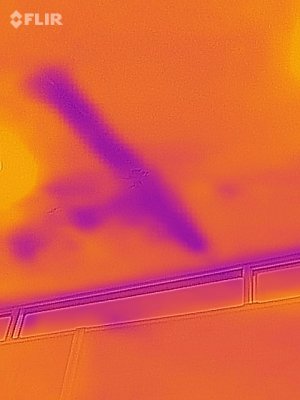
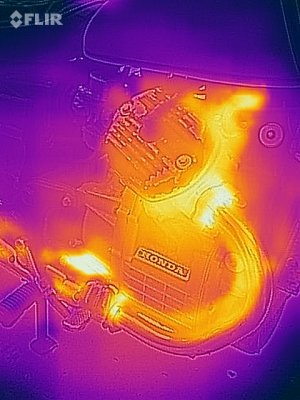
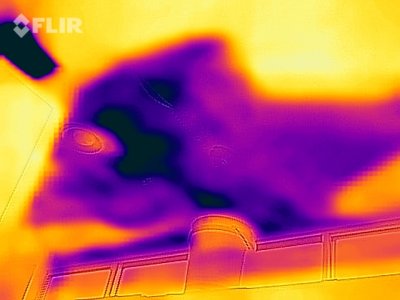
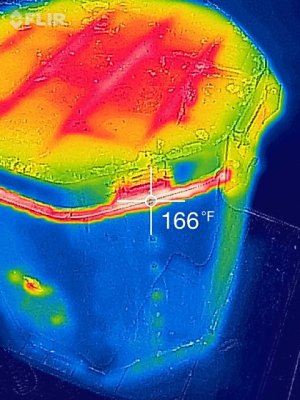
Attachments
Picture of a radiator please?
I don't personally have any radiator photos and my coupe isn't running right now, but I found some on the web.
Here's a link to a post with several shots of a tight engine compartment.
I've attached a shot of a radiator that looks like it's got some partial blockage.

Here's a link to a post with several shots of a tight engine compartment.
I've attached a shot of a radiator that looks like it's got some partial blockage.
I use a Seek Thermal small iPhone camera. Cost is reduced from traditional Flir as they don't have an optical image but only the thermal image but it is more than sufficient. Thermal point and shoot guns can be significantly off.Picture of a radiator please?
V12 Radiator thermal imaging
This is "V12 Radiator thermal imaging" by Luis A. on Vimeo, the home for high quality videos and the people who love them.
Forum - Here is the follow up on my unusual hot running condition. ( Hot at speed, cool at idle) I rebuilt the cooling system (new water pump, radiator, and thermostat) and added Water wetter - no joy, just a 5 to 10 deg F cooler. Timing was somewhat advanced ( but no pinging) about 25degrees BTDC at 2500 rpm - I didn't change it. Then I increased the fuel pressure by 3 psi to approx 32.5 psi. as suggested by above. Eureka ! Now running cool and better performance. A lean running condition was likely the root cause as Sfdon and others had suspected. I may back off a few degrees on the timing in order to be in spec but the performance is so good that I am reluctant to make any changes. I really appreciate all the help you guys
Thanks
Dana
Thanks
Dana
Maybe that’s a double pass radiator (which has 2 hot/cold zones)?looks like it's got some partial blockage.
Last edited:

